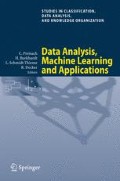Abstract
The term of Urban Data-Mining is defined to describe a methodological approach that discovers logical or mathematical and partly complex descriptions of urban patterns and regularities inside the data. The concept of data mining in connection with knowledge discovery techniques plays an important role for the empirical examination of high dimensional data in the field of urban research. The procedures on the basis of knowledge discovery systems are currently not exactly scrutinised for a meaningful integration into the regional and urban planning and development process. In this study ESOM is used to examine communities in Germany. The data deals with the question of dynamic processes (e.g. shrinking and growing of cities). In the future it might be possible to establish an instrument that defines objective criteria for the benchmark process about urban phenomena. The use of GIS supplements the process of knowledge conversion and communication.
Access this chapter
Tax calculation will be finalised at checkout
Purchases are for personal use only
Preview
Unable to display preview. Download preview PDF.
References
BEHNISCH, M. (2007): Urban Data Mining. Doctoral thesis, Karlsruhe (TH).
DEMSAR, U. (2006): Data Mining of geospatial data: combining visual and automatic meth-ods. Urban Planning Department, KTH Stockholm.
HAND, D. and MANNILA, H. (2001): Principles of Data Mining. MIT Press.
KASKI et al. (1999): Analysis and Visualization of Gene Expression Data using Self Organiz-ing Maps, Proc NSIP.
KOHONEN, T. (1982): Self-Organizing formation of topologically correct feature maps. Bi-ological Cybernetics 43, 59-69.
RIPLEY, B. (1996): Pattern Recognition and Neural Networks. Cambridge Press.
STREICH, B. (2005, S. 193 ff.): Stadtplanung in der Wissensgesellschaft - Ein Handbuch. VS Verlag für Sozialwissenschaften, Wiesbaden.
ULTSCH, A. (1999): Data Mining and Knowledge Discovery with Emergent Self Organizing Feature Maps for Multivariate Time Series, In: Oja, E., Kaski, S. (Eds.): Kohonen Maps, pp. 33-46, Elsevier, Amsterdam.
ULTSCH, A. (2003): Pareto Density Estimation: A Density Estimation for Knowledge Dis-covery, Baier D., Wernecke K.D. (Eds), In Innovations in Classification, Data Science, and Information Systems - Proceedings 27th Annual Conference of the German Classifi-cation Society, Berlin, Heidelberg, Springer, pp. 91-100
ULTSCH, A. (2005): U*C Self-organized Clustering with Emergent Feature Map, In Prooceedings Lernen, Wissensentdeckung und Adaptivität (LWA/FGML 2005), Saar-brücken, Germany, pp. 240-246
ULTSCH, A (2007): Mining for Understandable Knowledge. Submitted.
Author information
Authors and Affiliations
Editor information
Editors and Affiliations
Rights and permissions
Copyright information
© 2008 Springer-Verlag Berlin Heidelberg
About this paper
Cite this paper
Behnisch, M., Ultsch, A. (2008). Urban Data Mining Using Emergent SOM. In: Preisach, C., Burkhardt, H., Schmidt-Thieme, L., Decker, R. (eds) Data Analysis, Machine Learning and Applications. Studies in Classification, Data Analysis, and Knowledge Organization. Springer, Berlin, Heidelberg. https://doi.org/10.1007/978-3-540-78246-9_37
Download citation
DOI: https://doi.org/10.1007/978-3-540-78246-9_37
Publisher Name: Springer, Berlin, Heidelberg
Print ISBN: 978-3-540-78239-1
Online ISBN: 978-3-540-78246-9
eBook Packages: Mathematics and StatisticsMathematics and Statistics (R0)

